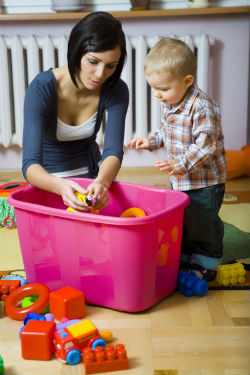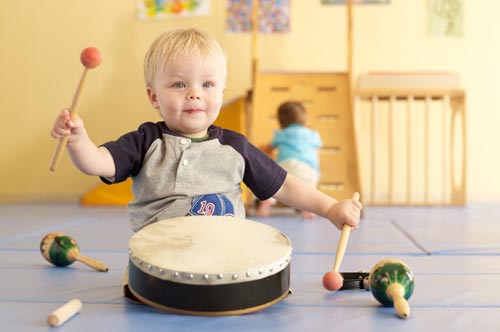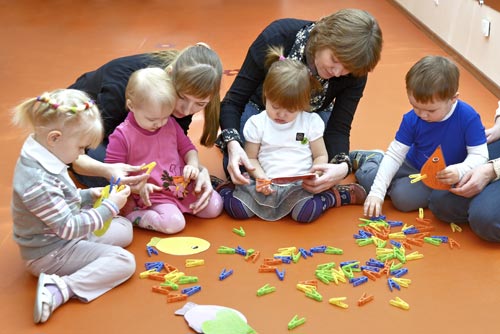The whole truth about early development, or the most important thing in the first year of a baby’s life. Does the child need early development

Many consider early development to be unnecessary and premature. Why teach a child something if he will learn all this in school? It deprives the child of childhood! It is bad for a child! We will answer in order to all these "arguments".
School will teach everything?
Why do you think your child’s school will be taught well? That teachers will have the desire and time for the individual approach it to your childand not to several dozens of others?
Only his own parents, who know their child well, can help him become interested in learning. Or do you want to check the diary in the old-fashioned way and punish for bad grades? These twos and threes will not be his, child, and your parents. You're all piled on school ...
Do you have any doubts? Look at the physical education classes at school. Do you know why when recruiting children the sports sections are guided by the principle “the sooner the better”? Just because school physical education lessons not only will not make an Olympic champion out of a child, but will not even allow one to master at least one sport properly.
Do not deprive children of childhood?
You are not forced to put the child at the table for forty minutes to make you stupid: “Ji-shi write with a letter and!”, Then make a five-minute break and arrange an interrogation with addiction “How much will be two and two? Think fast! ”
Playing numbers and letters is not less interesting for a child than for cars or dolls. Will he do it - it depends on you.
A simple examination of trees and grass during a walk can be turned into a lesson in natural history. There is only a small nuance: you yourself should know what the elm differs from ash, and what is the name of this plant with broad leaves. Of course, you are busy with more important things than constantly answering something to the questions the child is endlessly asking. Yes, and you're tired, you need to relax, discuss the last broadcast of “House-2” and do a bunch of equally important things. So do not talk about depriving children of childhood, just admit that you are too lazy to be engaged in a child.
Is it bad for a child? 
Try to repeat all the movements of the child for at least half an hour. It is unlikely that you will withstand this load. The child is much tougher than you. Do not believe? Remember yourself in childhood and youth, and mourn how you had enough strength for everything.
The child easily remembers several unfamiliar words at once. Doubt? Remember the “bad” words that children remember when they hear them only once. It’s unlikely that you will learn Swahili or Hindi curses so quickly. Come up with your child to play the "secret" language and learn the same English. In a quiet whisper and “on the big secret” tell the child that the “dog” in a secret language is called “dog”, and this knowledge will be imprinted in the memory of the “young conspirator” forever.
There can be no harm in the child being gain knowledge playing interesting games. Harm can be brought only by inattention or tyranny, but early development has nothing to do with them.
And remember, dear mothers and fathers, that there are enough fools in this world, so do not join their ranks with your dear children.
You are a mother! The first year of diaper-diaper madness behind, and the school is still very far away. It would seem that it's time to just enjoy motherhood and watch how the baby perceives the world around.
But ... a neighbor gave birth a month later than you, and her child is already talking connected! And your barely babble ... And look, they will begin to learn the letters - not to be late, by three years, they say, you can already know the whole alphabet! We need early development !!!.
What is the need for earlier development?
We won’t even ask ourselves whether early development is necessary at all - I hope this question has long been rhetorical for modern parents! Of course, it is necessary to develop and train a child from a very young age: it is important to improve speech skills, fine motor skills, and thinking!
However, every mother without any clever books on her own experience knows that such improvement takes place daily: in everyday communication with the baby, in games - almost any action gives something to the child, no matter how little the child “doesn’t do anything ".
All popular pedagogy is aimed at early development: here the traditions of cuts, “ladies”, lullabies, games, etc. In principle, if nothing is taken beyond these simple and natural actions for any mother, the child will grow up absolutely normal, without delays in development and deviations in upbringing - and this has been happening for thousands of years!
But in recent decades, special pedagogical methods have been developed, aimed at instilling in the child certain knowledge and skills much earlier than is customary. For example, learn to read at 3 years old, and count at 4.
About some of them (for example, o), the site “Beautiful and Successful” has already been told. We will not go into details now, but the general idea of all the techniques is that a child can perceive and memorize a lot and is quite difficult if you teach information in the form of a game or other activity that is natural for a kid of this age. For example, letters are depicted on cubes from which a child builds turrets, etc.
Is this early development needed and does it work? Theories say that if done correctly, the result will be in any child. In practice, both mothers and caregivers notice that with one child all this is pretty good, but with others there is no result or it is insignificant.
Why? The thing is that different children perceive information differently and think a little differently. For example, it is easier for one to deal with visual images (for example, to fold “Nikitin squares”), the other remembers well by ear, the third one has to tweak something tangible in pens, etc.
Again, sedentary quiet exercises like drawing are quite feasible for some children, while others are restless - for them the emphasis should be placed on outdoor games.
And ... quite often it happens.
One child of two years of age is taken to various classes and diligently testing smart methods, but the result is insignificant, the child develops approximately on a par with “undeveloped” peers, parents curse hacks tutors and “wrong” methods. And with the other child they do not do all this, raising traditionally.
As a result, the first one begins to read at the age of five - mother is finally proud and ascribes this miracle to techniques. And the second at the same age for the first time sits down at a Soviet primer with a blind-sighted grandmother and ... after a couple of weeks, already cheerfully parses the letters no worse than the first, “developed” peer!
What's the matter? And so it happens - some “structures” ripen in the brain, something “clicks” - and the child quickly and with the fly masters what they “cram” into another with two-three years!
That is, it is often necessary to develop early when the child is already ready to accept this or that information - the main thing is to choose the method of its presentation that is most suitable for your child!
What early development is needed?
Very often, early development is needed to satisfy maternal pride: here, look, we are three and a half, and we know the letters, we distinguish colors, we draw the sun in an even circle - and my baby is the cleverest, and I am an ideal mother!
Peers really do not know the letters, colors, and draw squiggles.
But the children go to school and ... it turns out that those who, in three years due to the methods of early development, seemed to be geeks, caught up with the “lagging behind” and go to school on an equal footing. Further study may not reflect the “breakthrough” that happened at 3, 4 years ...
Based on this, is early development needed?
Answering this question, you need to honestly decide why it is your child? Just learn how to read-write? Or, maybe, in general, develop fine motor skills, train memory, logic, make creative skills manifest - and it doesn’t matter that the child doesn’t read, and, for example, he begins to paint wallpaper with fantastic masterpieces?
The second answer seems here, in the article, to be so logical and correct, but many leaders of children's studios and groups regularly hear this from their parents: “Will he start reading?”.

Are there any real benefits from groups (schools, studios, etc.) of early development?
So, you decided that the baby needs early development. There are many methods, and various studios, schools, groups, private kindergartens appear like mushrooms ...
Start somewhere to drive the baby or engage in development activities at home, having studied the techniques using books?
Let's say right away - the second is quite real. Nothing supercomplex that mom cannot master, teachers with preschool children do not do it!
Moreover, homework with mother is often more effective than in group with other kids and an unfamiliar aunt-teacher! Mom more sensitively catches the reaction of the child - is it clear to him, is it interesting, is he not tired? And the child is not distracted and does not close due to unfamiliar surroundings and strangers, as is the case with young children.
But the group has advantages.
First, the peer team. Communication skills - a very important thing for the development of the child! Sometimes exactly what is being done together, amicably (or vice versa, if there is a competitive moment), stimulates the child to something that he would not remember at home or fulfill! Even very young children often try to do the best of all, show how it happened, etc.
In addition, sometimes children are more attentive to what the stranger says, and not the home.
And besides ... well, let's be honest?
Often, mothers who believe that a child needs early development in a group are simply tired of constantly engaging young children on their own.
This is not a reproach - indeed, it is very difficult both physically and psychologically to constantly be with a nimble toddler, and not just to look and care, but to educate, develop, engage ... And the opportunity to take the child for an hour or two to a group where it is interesting and useful to work with him other people are not so bad!
Copying this article is prohibited!
It has been scientifically proven that 20% of children have the makings of geeks. But the real situation is that there are only a few geniuses among us. No one says that the remaining 80% of children are mediocre. Simply talents embedded in them, you must be able to see and support. For this purpose, numerous developmental techniques have been created, thanks to which your child will read, write and count much earlier than his peers. The only question is who needs it.
It is known that the human brain develops most intensively during the first three years of life. The creators of early development methods emphasize this fact. Initially, many of these techniques were developed for children with mental disabilities. The result exceeded all expectations! At that moment, the idea appeared to apply the same methods to ordinary, perfectly normal children. After all, you can grow a genius from any child!
Attractiveness and general fascination with early development techniques are easy to explain. What parent will not be pleased to watch when his child recites verses, distinguishes between many shades of color, quotes an encyclopedia, while the rest are just beginning to speak and barely distinguish colors?

As practice shows, children with whom they have been intensively engaged since birth, occupy the first positions only in junior classes. Then there is a sharp stop and deterioration in performance. The fact is that early development techniques are aimed at stimulating the left hemisphere of the brain, which is responsible for logic and abstract thinking. With normal development, this hemisphere begins to function much later. Since birth, the right hemisphere has been active in the child. It provides knowledge of the world through emotions and feelings. Thus, the system of early development, contributing to the development of the left hemisphere, suppress the right. And this in itself is a deviation from the norm, which makes itself felt in the future decline in performance, the appearance of chronic fatigue, a problem in communication, inability to adapt to the surrounding society.
Therefore, it is definitely not worthwhile, from early childhood, to load a child with all kinds of developmental activities, English almost from birth, etc. The same goes for dancing. Do not drive to those dances where children preschool age they make stretch marks and teach the positions of classical dance at the barrels more than they dance with them (of course, if you don’t grow a future ballet star). Children from 2 years old will be much more pleasant to repeat and learn new movements, dance to the music, and not pull the foot and sit on the splits. Children should not be hurt after dancing! Children's dances should remain childish, fun and light.

The optimum will be a couple of classes a day or a half-day garden where children will communicate with their peers, learn something in the game (no more than an hour a day), then eat and sleep at home during the day, and in the evening and on weekends play and learn the world with parents.
Being a parent is also a job. Much more important than the one we make money with. To speed up the development of a child or not - everyone decides for himself. Play together in your favorite game, splash in the river, show the real forest and the animals are not on the cards, but live - is this not the best development? And may you not become the parents of a genius, but next to you will be an intelligent, empathetic, able to make decisions and take responsibility, a person dear to you in spirit. The person who will be grateful for your carefree childhood. And so it should be.
Parents, guided solely by good intentions, strive to donate their children to all sorts of clubs and sections as early as possible. The concept of “early development” has already become familiar, and today two-year-old children study according to the program of the first grade of school. The Village has learned from experts whether it is always beneficial.
Oksana Orlova
child psychologist
In psychology, there really is a concept of early development - when the efforts of parents are aimed at teaching the child to read, write, classify objects and so on as early as possible. This process has its advantages and disadvantages. It happens that a child with whom they have been intensively engaged may go to school early, but his psychological development, unlike the intellectual one, will be delayed. Such children often communicate easily with adults, but have difficulty building relationships with peers, because they seem to have nothing to talk about. And therefore, they miss such important stages of formation as socialization, maintaining competition, presentation of oneself.
Of course, there are gifted children who begin to read, write and play instruments at an early age. But developing their abilities, we should not forget that children should also be able to play, build relationships with their peers, obey their elders. Otherwise, it turns out that the child quickly integrates into the work, learns a lot of useful things, but, for example, does not know how to live in unstructured time, is not able to occupy himself. Often, when the child is not quite mature, and his hard draw into school, the situation turns into neuroses. If we draw an analogy: children, like plants, should be given fertilizer to grow. When one flower blooms earlier than others, it is beautiful and healthy, but will it survive the frost? Indeed, at the same time, the child develops a nervous and hormonal system, and with a high load, the young body can simply break down.
Now it is considered the norm, if children start reading by the age of five, but there is no single rule for everyone, everything is very individual. A child, for example, may be good at sports, but late in reading. In this case, it is absolutely wrong to compare your children with others: this can develop a sense of insecurity in them, suppress the will.
Early development has become fashionable, and parents are totally addicted to it. Arises interest Ask: why do adults need it? There is an opinion that children are a narcissistic expansion of parents, their business card. That is, looking at the child, you can tell what his mom and dad.

Evgenia Berdichevskaya
neurologist, Deputy Director General for Medical Activities, Doc 24
A baby is born with the maximum number of brain cells that form neural connections during the first two to five years of its life. Children under the age of two years in the brain have the greatest number of neural connections necessary for the development of intelligence. Further in the process of growing up, their number only decreases. Studies have been conducted in the United States that confirm that the more work you do with a child at an early age, the greater the return will be. Experts compared two groups of babies: from socially prosperous and disadvantaged families. In the former, the level of development, other things being equal, turned out to be higher just because they were engaged. At the same time, I do not call parents from infancy to send their children to school and teach three languages - there should be an adequate approach in everything.
Often, adults go too far, trying to stuff a child with all sorts of knowledge. Once I was approached by parents who complained about the problems with the behavior of their son. When I found out the schedule of this unfortunate child, I realized that with my four works I had more free time. In his schedule were classes in English, Hebrew and music, he also went to tennis and physical therapy. Of course, this child was tired at some point. At the same time, developmental activities in moderate amounts are only beneficial at an early age.
In addition, modern children acquire basic knowledge earlier than those who grew up, for example, several decades ago. There are all prerequisites for this now: this is evolution (both psyche and evolution are in close connection with each other), and the rapid development of technologies, and the spread of early development techniques. And if a child could learn to read or play a musical instrument in three or four years, then his psyche allows him to do it. Often the promise associated with obtaining early knowledge comes from the children themselves. Among my patients was a boy whose parents said: “We do not know what to do. He does not part with the books, sits all day and studies everything himself, and then comes to kindergarten and trying to share his encyclopedic knowledge with friends. But peers do not react to it, because they are playing Transformers. ” Once this child came from the garden offended, abandoned all the books, said that he would no longer read at all, and asked him to buy him a transformer. As a result, we smoothly adapted it to encyclopedias and toys. Being engaged in the development of the child's intelligence, we must not forget that his psyche is childish.
But, if, for example, it turned out that the early development of the child was not studied at all and he went to school without knowing the letters and counting, this does not at all mean that the kid will fall behind in school. It all depends on the environment in which children grow up. It happens, the parents basically want the child to have a childhood, and they don’t rape him before school. With this approach, one can also agree. The main thing is that the child has the right motivation, interest in life and knowledge.
Illustration: Nastya Grigorieva
· Why develop a child?
In order to:
. develop basic functions: attention, imagination, memory, logical and spatial thinking, the ability to analyze and generalize;
. create the necessary intellectual base, which will become a solid foundation for further successful learning, will make the child’s psyche more resistant to school stress;
. to bring up a happy, fully-developed person who will know what she wants and how to achieve it;
. your child was able to see the possibility of choice in life, could defend their life positions;
. the baby grew up healthy, active, strong, agile, energetic, with strong immunity;
. get closer to your child, learn from each other, make yourself and your child kinder, more attentive and spiritual, remain friends and after 20 years
· How to engage in development?
* Only in the form of a game! The kid will do only what interests him. Therefore, your imagination, good mood, love for your child are the most important requirements in the organization of your successful games-activities.
* Without coercion! It is necessary to listen to the desires and opinions of the child. No need to tie yourself and your baby to the time frame. If the baby is tired - finish it later, transfer the lesson to the next day, offer to play something else. Let the child choose an occupation for himself - by this you teach him to be independent.
* Development must be comprehensive:
Active physical development is the key to successful intellectual and emotional development. The most effective study in the period of growth of the human brain. The brain grows to 7 years, but it grows most intensely in the first 4 years of life. Therefore, the more parents physically develop the baby, the more highly its intellect will be, the easier it will be in later adult life.
· What will help in the development of the child?
In the free access you should have:
Everything for creativity - paints, plasticine, colored paper and pencils, felt-tip pens, glue, etc .;
. sports equipment - balls, pins, hoops, jumps;
. Role sets - kitchens, garages, doll houses, cribs, children's workshops;
. everything for intellectual development - cards, puzzles, mosaic, frame inserts, cubes, etc .;
. musical instruments - drums, children's synthesizers, tambourines, pipes, bells;
. soft toys, dolls, cars;
. sports area - stairs, horizontal bar, slide, trampoline, mats, mounted shells - rope ladder, rings, rope, hammock, swing.
· What are children's sports corners?
* Swedish walls - occupy little space and have low cost, oriented for children from 3.5 years. The peculiarity of the Swedish ladder is that both children and their parents can pull up and hang on it.
* Sports corners "G", "T" and "U-shaped" - Of all the modifications presented, the “U-shaped” corners are the most functional, there is the possibility of using mounted projectiles. Suitable for children over 4 years old. Good for regular workouts between visits to sports sections.
* - used from birth and up to 7 years old, multifunctional (has 5 positions for games and occupations), occupies 1.5 square meters, does not require fastening.
· What are the main advantages of Early Start over other children's sports complexes? 10 pluses
1. Mobile - in 10 minutes it is assembled and disassembled into sections, it will easily fit in the trunk of most small, medium and family cars.
2. All-season - due to its mobility it can be used at any time of the year and anywhere. You receive: a children's sports complex for the house + a children's sports complex for the street.
3. Reliable - the center of gravity is evenly distributed on 4 corners of any of the faces, thanks to this Early start is safe, stable, stable and well balanced in any of 5 positions. Maintains a load of up to 200 kg. It takes several levels of quality control.
4. Safe - by production environmentally friendly raw materials and materials, not hazardous to health of children, are used. Early start meets all international standards. Provide yourself with peace of mind and confidence that your child is not only intact, but also protected by engaging in and playing at an early start.
5. Functional - the complex can be used in five different positions, it makes it always new and interesting for children of different ages from birth to 6 years. This horizontal bar, and the wall of the Swedish, and a playpen, a children's corner. Your fidget will not be bored.
6. Unique - all sizes, distances, diameter of crossbars, calculated by the engineering center, taking into account the age of the smallest users.
7. Developmental - A large and constantly updated range of accessories and game covers allows you to use not only in sports activities, but also in active developmental and role-playing games.
8. Universal - The Early Start design has all the necessary sporting elements: a sloping ladder, rukhod, horizontal bar, obstacle course, slide and much more, which allows you to grow a healthy, active, physically and mentally developed child.
9. Compact - Children's corner takes 1,5kv. m. Does not require attachment to the walls. Fast disassembly and assembly allows you to purchase a sports center for your home for parents who live in a one-room small apartment and want to raise a healthy, active child.
10. Durable - Early start frame is made of high quality steel. Interfaces of parts withstand a long service life, thanks to accurate, accurate, step-by-step processing. Early start durability guarantees safety
Maria Mantessori in her work focuses on the organization of children's space. In her opinion, the child should have three main areas:
Sports;
. sensory (there should be objects of different texture, water, massage balls, boxes with different smells, etc.);
. gaming
includes all these zones.
In the cold season, when the main part of the kids are at home, it is very important to give the child the opportunity to move a lot. That is why it is necessary to think in advance about the organization of the sports and games area. Believe me, this is much more important than foreign language or encyclopedic knowledge that a person will get, if necessary, even as an adult. Not everyone knows that the ability to climb up in children stimulates mental abilities, self-confidence. Who would have thought - having bought a sports complex for a child, you are developing a leader.
- The role-playing game as the main type of games for preschoolers place in the structure of children's games
- Logic Tricks for Adults
- Medical Institute with budget places
- "Our Tanya cries out loud ..." in the interpretation of the great poets
- Photo of the American flag, the history of the stars and stripes of the state symbol of the United States
- Exercise "The Most Important"
- Student training requirements

 Live journal
Live journal Facebook
Facebook Twitter
Twitter